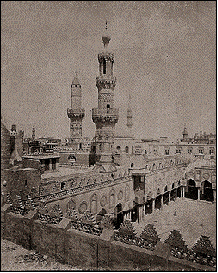Jawhar (general)
Jawhar (Template:Lang-ar; fl. 966–d. 992) was a Fatimid general that led the conquest of North Africa and then of Egypt,[1] founded the city of Cairo[2] and the great al-Azhar Mosque. A Christian slave by origin, he was freed by Al-Mu'izz.[3]
Biography
Abu al-Hasan Jawhar ibn Abd Allah[4] was originally a Christian from Dalmatia.[4][5] It was previously suggested that he was Greek or Sicilian.[6] He was brought to Kairouan (now in Tunisia) after being kidnapped by Muslim pirates on the Adriatic.[4] A slave having served several masters, he was granted freedom by Al-Mu'izz, the son of Ifriqiya Caliph Al-Mansur.[4] Soon he was the vizier and the highest-ranking military commander of the Fatimids. In this role he resumed the expansion of the Fatimids and, together with the Zirids, conquered Fez in Northern Morocco, and pushed towards the Atlantic. Only the strongholds of Ceuta and Tangier could be retained by the Umayyads of Córdoba.
After the Western borders had been secured, Jawhar as-Siqilli pushed towards Egypt and occupied the land around the Nile in 969 from the Ikhshidids after a siege at Giza. The conquest was prepared by a treaty with the Ikhshidid vizier Abu'l-Fadl Ja'far ibn al-Fadl (by which Sunnis would be guaranteed freedom of religion), so the Fatimids encountered little resistance. Afterwards Jawhar ruled Egypt until 972 as viceroy.
In this capacity he founded the city of Cairo in 969 north of Fustat, to serve as the new residence of the Fatimid Caliphs,[7] and the al-Azhar Mosque in 970. Although Palestine was occupied after the conquest of Egypt, Syria could not be overcome, following a defeat at the hands of the Qarmatians at Damascus. However, when the Qarmatians overran Egypt, Jawhar was able to defeat them north of Cairo on the 22 December 970, although the struggle continued until 974. To secure the southern border of Egypt a legation was sent to the Christian land of Nubia.
After the establishment of the residence at Cairo, Jawhar fell into disfavour with al-Muizz. Under his successor al-Aziz (975-996) however, in whose accession to the throne Jawhar played an important role, he was rehabilitated. He was regent again until 979, but was finally stripped of power after a campaign against Syria was once again defeated near Damascus. Jawhar died on 1 February 992.[8]
Epithets

- al-Siqillī (الصقلي, "the Sicilian")
- al-Rūmī ("the Rûm (Byzantine or Greek)")
- al-Saqlabī ("the Slav")
- al-Katib ("the Chancellor")
- al-Qaid ("the General"), chief general of Al-Mu'izz.[9]
See also
References
- ^ Chodorow, Stanley – Knox, MacGregor – Shirokauer, Conrad – Strayer, Joseph R. – Gatzke, Hans W. (1994). The Mainstream of Civilization. Harcourt Press. p. 209. ISBN 0155011979.
The architect of his military system was a general named Jawhar, an islamicized Greek slave who had led the conquest of North Africa and then of Egypt
{{cite book}}: CS1 maint: multiple names: authors list (link) - ^ Fossier, Robert – Sondheimer, Janet – Airlie, Stuart – Marsack, Robyn (1997). The Cambridge illustrated history of the Middle Ages. Cambridge University Press. p. 170. ISBN 0521266459.
When the Sicilian Jawhar finally entered Fustat in 969 and the following year founded the new dynastic capital, Cairo, 'The Victorious', the Fatimids ...
{{cite book}}: CS1 maint: multiple names: authors list (link) - ^ Saunders, John Joseph (1990). A History of Medieval Islam. Routledge. p. 133. ISBN 0415059143.
Under Mu'izz (955-975) the Fatimids reached the height of their glory, and the universal triumph of isma 'ilism appeared not far distant. The fourth Fatimid Caliph is an attractive character: humane and generous, simple and just, he was a good administrator, tolerant and conciliatory. Served by one of the greatest generals of the age, Jawhar al-Rumi, a former Greek slave, he took fullest advantage of the growing confusion in the Sunnite world.
- ^ a b c d Mikaberidze 2011, p. 448.
- ^ J. D. Fage; Roland Oliver (1975). The Cambridge History of Africa. Cambridge University Press. pp. 10–. ISBN 978-0-521-20981-6.
- ^ Mikaberidze 2011, p. 448: "was a Christian from Dalmatia (not a Greek or Sicilian as previously suggested)."
- ^ Irene Beeson (September–October 1969). "Cairo, a Millennial". Saudi Aramco World. pp. 24, 26–30. Retrieved 2007-08-09.
- ^ Monés (1991), p. 494
- ^ Farhad Daftary (24 April 1992). The Isma'ilis: Their History and Doctrines. Cambridge University Press. pp. 169–. ISBN 978-0-521-42974-0.
Sources
- Mikaberidze, Alexander (2011). Conflict and Conquest in the Islamic World: A Historical Encyclopedia [2 volumes]: A Historical Encyclopedia. ABC-CLIO. pp. 448–. ISBN 978-1-59884-337-8.
{{cite book}}: Invalid|ref=harv(help) - S. H. Prince Aly, S. Khan Colony, Religious Night School, The Great Ismaili Heroes: Contains the Life Sketches and the Works of Thirty Great Ismaili Figures, University of Michigan
- Monés, H. (1991). "Djawhar al-Siqillī". The Encyclopedia of Islam, New Edition, Volume II: C–G. Leiden and New York: BRILL. pp. 494–495. ISBN 90-04-07026-5.
